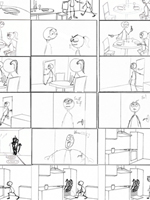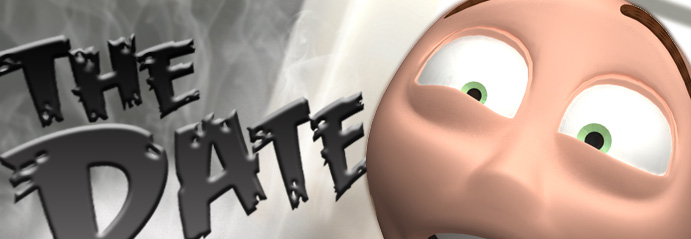
|
Animation Mentor:
How did you come up with the concept for your short film?
Emanuel Amler:
This was very difficult for me. We had to have three ideas for the short film and at first I wanted to go for the other two. They were both about tragedy and loss and were really sad and touching. But then I thought it would be too difficult to tell these stories in 30 seconds. I also wanted to have some physical and funny action in my film because in the sad stories there would have been only very sad and subtle animation. So I started focusing on The Date, but I plan to bring the other two movies to life one day. :)
So the concept behind The Date was not clear from the beginning. I already knew that I wanted to have a date situation and a big contrast between the characters. I also wanted to include at least a little bit of "so children, what did we learn from that?" :) For me, the lesson is, "Don't be too sure of yourself/arrogant and underestimate others. And if you want to be nice, the idea counts as much as the effort."
I thought how I felt about some of my dates. And then I knew what I wanted to do. I wanted a nice character who was really eager to show how much he liked the girl. First, I thought about a confident guy, but the more I thought about it (and also to have a nice character arc) I decided to have a shy guy that fails, but succeeds in the end in an unusual way. My mentor Elliot Bour and all my Animation Mentor buddies helped me develop the idea. At first, I wanted to have a nice girl as a second character, but then Elliot and the others suggested that she be mean. They said, "Wouldn't it be cool if she was really arrogant but in the end she changed too?" I really liked that idea. :)
No, the dog food idea is NOT based on actual events. I don't know how many times I was asked that question, but believe me, I would never serve dog food to another person. At least not the kind I wouldn't eat myself. Just kidding! :)
Animation Mentor:
What important lessons did you learn from making your short film?
Emanuel Amler:
- Record video reference! I didn't do it enough and later on I was struggling more than necessary.
- Focus on one character at a time.
- Go to sleep when you just can't improve your shot and it's already two in the morning! This didn't happen often because I managed my time very well, but when it happened I really had to force myself to stop. Every time I did, I was glad the next morning. It's really important to get some distance from your work and look at it later with fresh eyes.
- If you have a down day, don't panic. You just can't create great animation every day. There are times when it just works, but you must also accept that there are times when it just doesn't work that well. That actually was the biggest lesson for me.
Animation Mentor:
What was the best piece of advice you received from your mentor or your peers?
Emanuel Amler:
The best advice I got was when Michelle Meeker (my mentor in Classes 3 and 6) told me not to panic when I had a down day. She was so understanding, and it really helped to hear that even when you are a great animator you just have times like that. You are not alone! :) She also told us what you can do to overcome it,- like having a list of things you should check, one after the other. For example, just focus on arcs, then eyes, then the hands, then the fingers, etc. Or just take a day or two off and do something you like. Go out, watch a movie, read a book, and get enough sleep. You will approach things very differently when you are "recharged" again. :)
Animation Mentor:
What were the steps you took in your planning process?
Emanuel Amler:
Once I knew the idea for the movie, the planning was just standard procedure. I kept going through the whole idea in my mind over and over again. I always tried to imagine the animation and timing before I even started making thumbnails. When I created the thumbnails, I recorded some video reference at the same time. I also thought about the environment and created a rough layout and did some tests with the size of the chairs, the table – basically everything that the characters ever touch. I also did lighting tests for the set and played around with different colors. In the end, I desaturated everything so the characters would pop out a bit more.
Animation Mentor:
Do you mind sharing some of the pre-production work with us with a little explanation of what we're looking at?
Emanuel Amler:
 Click image to enlarge
Click image to enlarge
These are the thumbnails I used for the animatic. As you can see, my drawing skills are... :) Anyway, it helped a lot that I already had a rough layout of my set, and I used screenshots of that to get the perspective a bit better.
This is my story pitch. I hope you can understand my accent! :)
I tried to get the timing right in the animatic. It's a bit difficult and of course it's not the same in the final version. What really helped me was to imagine the animation. I also found a nice piece of music that suited the style that I wanted very early on.
I really don't like stepped keys because every time you go to splined, you have so much stuff to fix so my "layout" is a bit like a first pass of blocking.
Here, you can see a rough version. It's already a bit like blocking plus. Even though it's quite fluid, I still kept my keys managed in a way that I could easily make changes if they were required. That's a good idea in general. :)
This is my final rendering! As you can see, I changed the colors a lot. The curtains, the picture and the picture frame are not in an eye-catching red anymore. I also used a lot of light sources to get a soft, romantic look in the dining room. The kitchen is lit much brighter to have a better contrast.
Animation Mentor:
What obstacles, if any, did you experience during the creation of your short film? How did you work your way around them?
Emanuel Amler:
I think sooner or later, everybody has some troubles during the creation of the short film. I didn't have so many troubles actually planning/animating as I did with other things in life. My dog died (you can see him at the end of the credits), my car broke when I really needed it, and some other things also happened. Of course this affected my work. And then I had times where I really thought to myself, "Damn, you so can't create good animation! Look at all the other cool short films -- ours is just bad... focus! Fooocuuss!!!" :)
So how did I overcome that? First, I took some time off. For example, I told my mentor Michelle Meeker about my troubles and she told me that it was OK if I didn't submit a perfect piece of work for one or two weeks – that it was better if I got myself sorted out. So I started to accept that I was also just human and that there was more to life than work and that helped me a lot. I took some days off, did what I liked and then I was recharged and could work again. When I finished my short film I was actually proud of what I had achieved. :)
Animation Mentor:
How did Animation Mentor help you create your short film?
Emanuel Amler:
It helped me in many ways! First of all, there is this great support from everybody. I made a lot of really good friends at Animation Mentor and got a lot of great feedback. Every mentor I had was just great. And I don't just say that. I was working as an animator in games for several years and I was quite good, but because Animation Mentor has such good people from the industry, you learn so much! There was so much productive criticism and feedback; I really had the chance to actually finish my short in time with the quality I hoped to achieve. Of course, there are many things I still see and would like to improve, but I guess that will never change when it comes to your own work. I don't think I would have been able to make my film with that level of quality without the education and help from everybody at Animation Mentor. Thanks again to everyone! :)
Animation Mentor:
What advice do you have for other students who haven't started their short film yet?
Emanuel Amler:
Keep it simple. It's very difficult to tell a complicated story in 30 seconds (my short film is also longer). Try to think about special effects like smoke, water, and cloth in advance and also think about workarounds if you can't get what you want.
|

|



